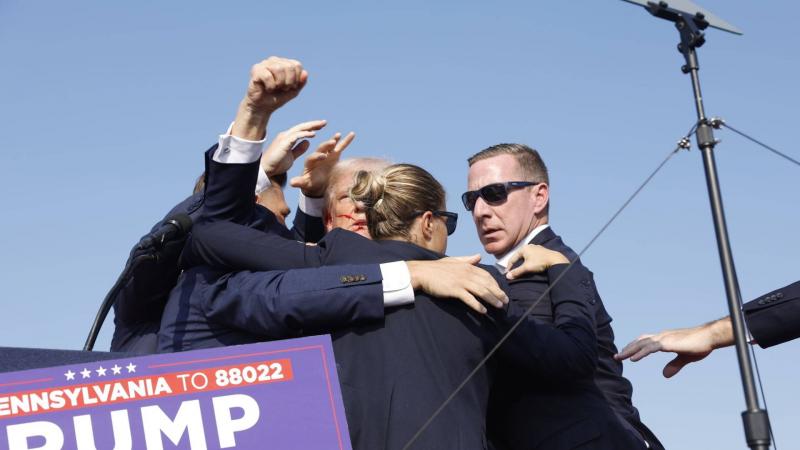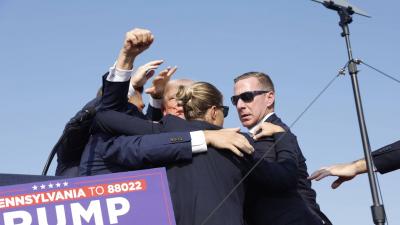So far, it cannot be assumed that the foreign policy of the United States during former President Donald Trump’s administration will replicate exactly if he wins the election battle next November. However, what Trump did and said during his first presidency from 2017 to 2021, particularly regarding the Middle East—specifically Iraq, Iran, Syria, and Palestine—may serve as a guide for what is to come.
If Trump were to become the 47th president of the United States, as predictions and polls currently suggest, and as his chances have indeed increased after surviving an alleged assassination attempt recently, he would manage the affairs of the country and its foreign policy in his usual business-style approach, based on "profit and loss" criteria. There is no clear ideological framework for this populist man, who does not carry a rich political legacy and believes that global issues and crises are managed and resolved on the principle of deal-making.
Foreign analysts predict that countries such as Iraq, Iran, Syria, and Palestine would be among those most affected by Trump’s return to the White House, having previously experienced the positions and policies of the Republican president concerning the Middle East. Generally, Trump's years in power were characterized by his preference for the "America First" option, focusing on domestic American issues and challenges instead of spending money and investing in international and regional organizations and alliances. He withdrew from numerous international organizations and ceased work on international agreements, even attempting to withdraw from NATO.
On the same deal-making principle, Trump recently stated that instead of the significant engagement the current president Joe Biden has made in the Ukrainian-Russian war, he is prepared to propose a deal that would end the war within weeks and persuade Russian President Vladimir Putin.
**Selection of Vice President**
No evidence of Trump's deal-making and conciliatory approach is clearer than his choice of vice president, J.D. Vance, known for his hostile stance towards Trump and mockery of his ideas, who is now his partner in running for the presidency. Observers believe that this inward-looking trend may be reinforced with Trump’s choice of Vance, who is recognized for adopting the "America First" principle.
Regarding the Middle East, it is essential to recall several critical points and positions that characterized Trump's "first term," which may serve as indicators for his "second term."
**Iraq**
Trump previously criticized former President George W. Bush's decision to invade Iraq during his initial campaign, describing it as causing "a wave of turmoil and chaos in the Middle East," stating he opposed the invasion. However, he did not hesitate to threaten the government of Adel Abdul-Mahdi and the Iraqi parliament with "severe sanctions" when they convened to discuss ending the presence of foreign troops on Iraqi soil. This was after Trump himself had made the controversial decision to assassinate Iranian Quds Force commander Qassem Soleimani and Deputy Chairman of the Popular Mobilization Committee Abu Mahdi al-Muhandis on January 3, 2020, in an airstrike near Baghdad Airport.
This assassination plunged US-Iraq relations, which had been relatively stable, into a new phase of turmoil and tension, with increasing attacks by armed Iraqi factions against US forces throughout Iraq and Eastern Syria. The embarrassment was significant as the governments, from Abdul-Mahdi to Mustafa al-Kadhimi and now Muhammad Shia al-Sudani, have had to work on containing the repercussions of that assassination while trying to achieve a difficult balance between the internal stability of the ruling parties and the interests linking Baghdad to the US and its security and economic presence in Iraq.
Before and during his first presidency, Trump had several visions and ideas for addressing the Iraqi issue. For instance, he repeatedly threatened Iran with "massive retaliation" if it launched attacks on US interests in Iraq and the region, yet Iran acted otherwise by bombing Ain al-Assad base after the assassination of Soleimani and al-Muhandis.
Trump also attempted to outline his vision for strategic relations with Iraq based on principles he established: reducing Iranian presence in Iraq, boosting US military presence and protecting soldiers, and securing concessions from Iraq for the freedom of movement of US forces—even if their activities overlapped with US military presence in Eastern Syria. Upon taking office, he pledged to eradicate ISIS from Iraq within 100 days, send more soldiers to Iraq, and work toward establishing a friendly government in Baghdad.
On January 28, 2017, Trump signed a presidential memorandum ordering the preparation of a new plan to defeat ISIS, which was to be presented by the Secretary of Defense within 30 days and implemented immediately, including the following objectives: a comprehensive strategy and plans to defeat and eliminate ISIS, resorting to popular diplomacy, information operations, and electronic strategies to isolate and delegitimize ISIS and its extremist ideology, and working to cut off and freeze ISIS's financial supplies through money transfers, money laundering, and stolen antiquities trafficking, among others.
Months after the assassination of Soleimani and al-Muhandis, specifically in April 2020, Trump's Secretary of State Mark Pompeo called for a "strategic dialogue" between the US and Iraq to discuss the future of their bilateral relations through a series of meetings between senior US and Iraqi officials, exploring all aspects of US-Iraqi relations.
A crucial aspect of Trump's perspective and dealing with Iraq was connected to his views, stance, and policies—if he had any policy towards it—regarding Iran, with part of the tension in US-Iranian relations having direct repercussions on the Iraqi stage, culminating in the assassination of Soleimani and al-Muhandis.
**Iran**
Trump sparked tension with Iran when he decided to withdraw from the nuclear agreement with Tehran and reinstate sanctions on May 8, 2018. At that time, Trump argued that the nuclear deal failed to halt Iran's efforts to acquire nuclear weapons or deter it from continuing to develop its ballistic missile program, emphasizing the need for a replacement agreement to that signed by Barack Obama.
Now, Trump and Vice President Vance may play a significant role in shaping the relationship with Tehran in the coming stage. Although the nuclear agreement has not been resurrected, since the disastrous withdrawal in 2018, Iran has made substantial advancements in enhancing its nuclear program and has regained much of its lost economic and financial interests due to the "maximum pressure" policy that Trump applied against it.
It is ironic that while Americans may reinstate Trump to the White House, the Iranians selected a reformist candidate to assume power in Iran. It remains unclear whether Trump will revert to the "maximum pressure" policy against Tehran or heed some calls within American ruling circles to give the reformist president in Tehran an opportunity.
Recently, Vance stated in a television interview that he supported Trump's policies during his first presidency but noted that to confront the hostile actions of the Iranian regime, Tehran needs to receive "a strong punch." However, when Iran launched attacks using missiles and drones against Israel about three months ago, Vance argued that Washington should act to prevent the escalation of confrontation with Iran in a manner that harms US interests.
However, it is certain that Trump and Vance are more aligned with Israel, as their statements indicate. Throughout the Gaza War, Trump did not make a clear statement criticizing Israel or calling for pressure on it to halt what many international parties consider to be genocide against Palestinians. Indeed, Trump, during his televised debate with President Joe Biden, accused him of being "Palestinian" due to his stance on the war.




